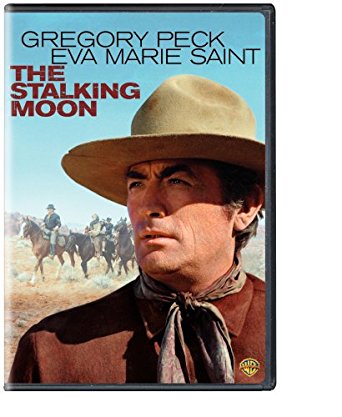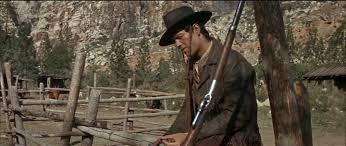One of the many Westerns that Gregory Peck (1916–2003) made. That alone recommends it. The opening scene is superb and those that follow in the first act are on a par with it. Then comes the slide….

The silence, the eternal and forbidding landscape, the big sky, and the taciturn dialogue get it off to a good start.
Robert Forster steals some scenes from his mentor Peck, but ever gracious Peck rolls with it. Forster has since been in every television program there is but never equalled this turn.
 Robert Foster waits.
Robert Foster waits.
There are some moments of humour as with the train ticket that it would take an IRS accountant to figure out.
Harder to take is that chiseled block of satin wood, Eva Marie Saint. That she is largely silent helps but the constant squeeze of the frontal lobes indicates her thespian range. When she speaks it is in whispers which I suppose is to add to the drama. It didn’t. (I admit that she was superb in ‘Don’t Come Knocking’ [2005] with Sam Shepard. Maybe with age directors were less inclined to limit her to eye-candy.)
Most of the faults of this film, however, lie with the screenplay and the director, Robert Mulligan (he of ‘To Kill a Mockingbird’), and not the players. Where to start?
Eva, after ten years of (implied) brutal captivity, emerges with makeup intact and speaks English within five minutes as though nothing had happened. It is a strength of the screenplay that what happened is left to the viewers imagination and not stated, agreed. Yet she is none the worse for it.
Peck’s change of heart is a plot device and nothing more. It does not emerge from the events or his character. He says she can cook for him and Ned, but in the only scene of cooking, Ned, does not eat with them. Ned, too, is a plot device and meets the fate of a Star Trek Red Shirt in due course. That was obvious from his first appearance.
The aggrieved indian husband come to fetch home his son is granted no humanity. He is a spectre. Yet Peck has stolen his son as well as his wife. Why Peck chose to invite his wrath remains a mystery. This indian is supposed to be preternatural, yet when the showdown comes he is very visible and it must have taken practice to miss him with fusillade of rifle shots fired at him. He on the other hand drills Forester with one shot.
For a spectre he was none too bright. He lured the two younger men away but did not then go back to fetch his boy, who would have willingly come to him. Instead he prolongs the movie another twenty minutes. So that he can do the same thing again. In a Randolph Scott movie, made on a smaller budget, this kind of repetition did not exist.
But then Peck seems to lack smarts, too. In the last confrontation the indian is backlit in a doorway and Peck has a cocked rifle in hand, but waits politely for nemesis to enter the darkened room and shut the door so that they can slug it out in the dark. Go figure that one, Mortimer. Shouting at Peck to shoot, did not work. Indeed many of the interiors are too dark to see much.
Indeed the boy is likewise not granted humanity. He is a prop for Eva. That he might have collaborated with his father at the moment of truth seemed on the cards (joke, but to get it see the movie) but was forgotten come the time.
While decrying plot devices there is the dog. It is not present until needed for one scene, then is conjured as the watchdog. Ned’s reaction as that of a hardbitten frontiersman is a scriptwriter’s cliché.
The final contest between the two alpha males is a forgone conclusion. If that is all that was at stake, we all knew how that would end, and we did not need 1 hour and 59 minutes to get there.
I watched it on Daily Motion and read Roger Ebert’s contemporary review. He nailed it. But then when did he not?
Skip to content
